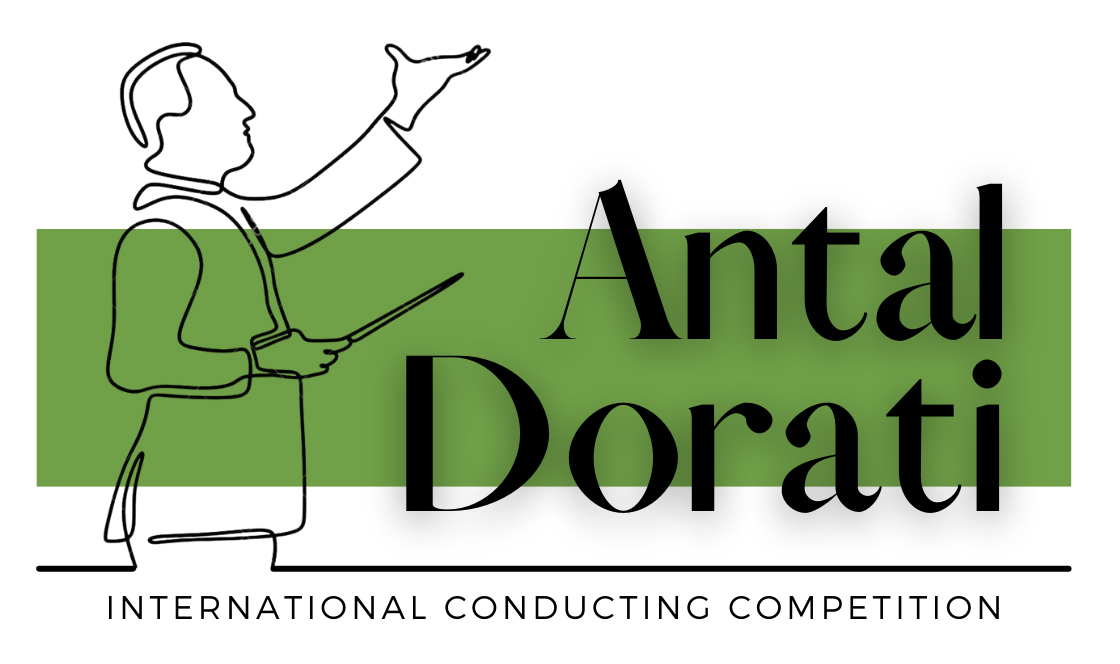ANTAL DORATI
BIOGRAPHY
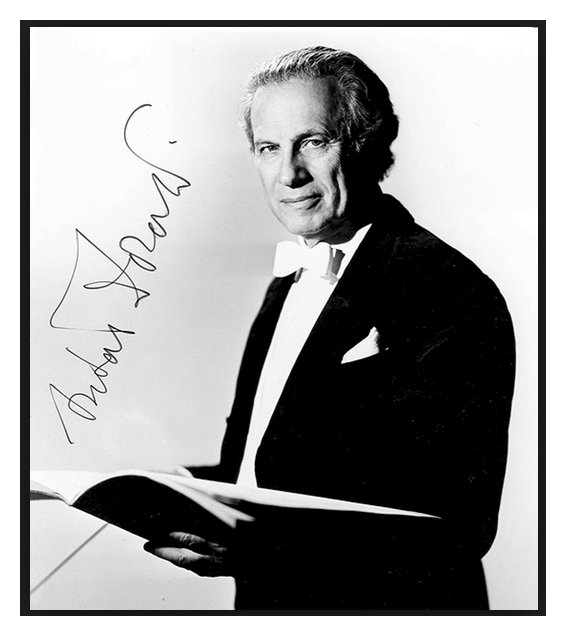
Antal Dorati (born April 9, 1906, Budapest, Hungary, Austria-Hungary [now in Hungary]—died November 13, 1988, Gerzensee, near Bern, Switzerland) was a Hungarian-born American conductor notable for his promotion of 20th-century music, particularly that of Béla Bartók.
The son of musicians, he entered at age 14 the Liszt Academy in Budapest, where he studied with Bartók, Zoltán Kodály, and Leo Weiner. He read philosophy at Vienna University and upon graduation became a private coach at the Budapest Royal Opera. His conducting debut took place there in 1924. In 1928 he became assistant conductor of the Dresden Opera and in 1929 became musical director at Münster Opera. From 1933 to 1941 he conducted and toured extensively with the Ballets Russes de Monte Carlo.
After his American debut in 1937 with the National Symphony of Washington, D.C., Dorati developed a marked ability to build and reorganize orchestras. From 1941 to 1945 he was music director of the newly formed American Ballet Theater. He went on to conduct the Dallas Symphony Orchestra (1945–49), the Minneapolis Symphony Orchestra (1949–60), the BBC Symphony Orchestra (1963–66), the Stockholm Philharmonic (1966–70), the Washington National Symphony (1970–77), the Royal Philharmonic Orchestra (1975–78), and the Detroit Symphony Orchestra (1977–81). He became an American citizen in 1947. Dorati’s many recordings include the complete Joseph Haydn symphonies (with the Philharmonia Hungarica). Throughout his career he broadened his orchestra’s repertoires, promoting modern music and commissioning new works. Notes of Seven Decades, his autobiography, was published in 1979.
Doráti held posts as principal conductor of the following orchestras:
Ballet Russe de Monte Carlo, Music Director (1937-1945)
American Ballet Theatre Orchestra (1941–1945)
Dallas Symphony Orchestra (1945–48)
Minneapolis Symphony Orchestra (1949–60)
BBC Symphony Orchestra (1963–66)
Stockholm Philharmonic Orchestra (1966–70)
National Symphony Orchestra in Washington, D.C. (1970–77)
Detroit Symphony Orchestra (1977–81)
Royal Philharmonic Orchestra (1975–79)
During the course of his life, he conducted almost all the top orchestras of his time, leaving a strong testimony of his art through recordings.
He made his first recording with the London Philharmonic Orchestra for the recording label His Master’s Voice. This was later transferred to RCA Records with whom HMV were for some time associated. Over the course of his career Doráti made over 600 recordings.
With the Philharmonia Hungarica, Doráti was the second conductor to record the complete symphonies of Joseph Haydn (the first complete recorded edition was conducted by Ernst Märzendorfer and the Vienna Chamber Orchestra, but it had a very limited release). He also recorded an unprecedented cycle of Haydn’s operas.
Doráti became especially well known for his recordings of Tchaikovsky’s music. He was the first conductor to record all three of Tchaikovsky’s ballets – Swan Lake, The Sleeping Beauty and The Nutcracker – complete. The albums were recorded in mono between 1954 and 1955, for Mercury Records, with the Minneapolis Symphony Orchestra (later renamed the Minnesota Orchestra), as part of their famous “Living Presence” series. All three ballets were at first issued separately, but were later re-issued in a 6-LP set. Dorati never re-recorded Swan Lake, but he did make a stereo recording of The Sleeping Beauty (again complete) with the Concertgebouw Orchestra of Amsterdam for Philips Classics Records, and two complete recordings in stereo of “The Nutcracker”, one with the London Symphony Orchestra (again for Mercury), and the other with the Concertgebouw Orchestra for Philips – all this within a span of about twenty-seven years. He also recorded all four of Tchaikovsky’s orchestral suites with the New Philharmonia Orchestra, and he was the first conductor to make a recording of Tchaikovsky’s “1812” Overture (featuring the Minneapolis Symphony Orchestra) with real cannons, brass band, and church bells, first in mono in 1954 and then in stereo in 1958. Both the mono and stereo “1812” were certified Gold Records by the RIAA. He also recorded all six of Tchaikovsky’s symphonies with the London Symphony Orchestra.
Other prominent composers in Doráti’s recording career are Béla Bartók and Igor Stravinsky.
He also made the first stereo recording of Léo Delibes’ Coppélia, with the Minneapolis Symphony Orchestra. An album set of Richard Wagner’s opera The Flying Dutchman is also among Doráti’s more popular recordings.
In 1969 he made the world premiere recording of Sibelius’s tone poem Luonnotar, with Gwyneth Jones as soprano soloist. In 1973 he conducted the world premiere recording of Max Bruch’s Concerto for Two Pianos and Orchestra, which was written in 1912 but only rediscovered in 1971.
He lived to make digital recordings, for English Decca Records (released in the U.S. on the London label), with the Detroit Symphony Orchestra, the Royal Concertgebouw Orchestra and the Royal Philharmonic Orchestra. One of these, the recording of Stravinsky’s Le Sacre du Printemps with the Detroit Symphony Orchestra, received the coveted French award Grand Prix du Disque.
FROM THE DISCOGRAPHY
A short excerpt of the recordings of Antal Dorati can be found here, for a comprehensive list please visit Discogs.com, which lists 796 recordings, including first releases and reprints.
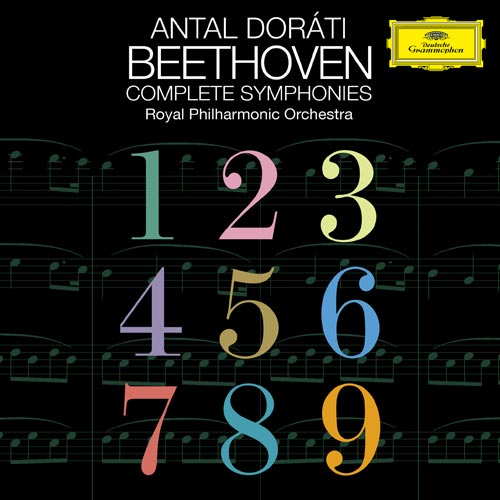
Beethoven, complete symphonies
Royal Philharmonic Orchestra
Deutsche Grammophon
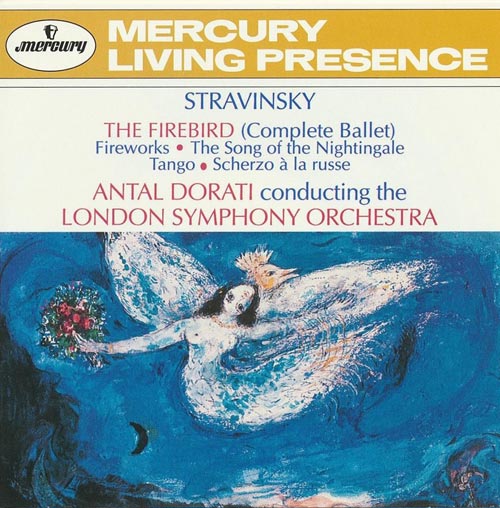
Stravnsky
London Symphony Orchestra
Mercury
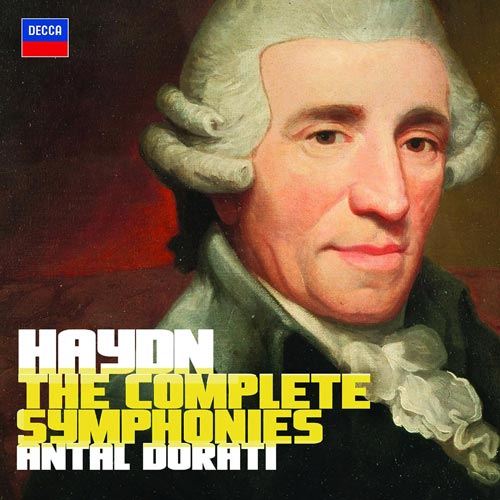
Haydn, complete symphonies
Philharmonia Hungarica
Decca

Stravinsky
Minneapolis Symphony Orchestra
Mercury
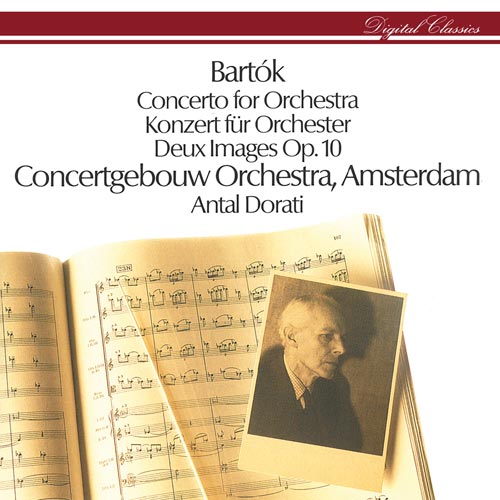
Bartok
Concertgebouw Orchestra, Amsterdam
Philips
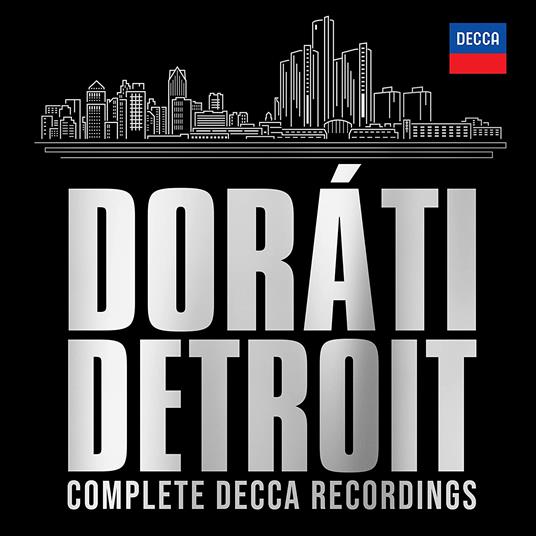
Complete Recordings
Detroit Symphony Orchestra
Decca
ANTAL DORATI
BIOGRAPHY

Antal Dorati (born April 9, 1906, Budapest, Hungary, Austria-Hungary [now in Hungary]—died November 13, 1988, Gerzensee, near Bern, Switzerland) was a Hungarian-born American conductor notable for his promotion of 20th-century music, particularly that of Béla Bartók.
The son of musicians, he entered at age 14 the Liszt Academy in Budapest, where he studied with Bartók, Zoltán Kodály, and Leo Weiner. He read philosophy at Vienna University and upon graduation became a private coach at the Budapest Royal Opera. His conducting debut took place there in 1924. In 1928 he became assistant conductor of the Dresden Opera and in 1929 became musical director at Münster Opera. From 1933 to 1941 he conducted and toured extensively with the Ballets Russes de Monte Carlo.
After his American debut in 1937 with the National Symphony of Washington, D.C., Dorati developed a marked ability to build and reorganize orchestras. From 1941 to 1945 he was music director of the newly formed American Ballet Theater. He went on to conduct the Dallas Symphony Orchestra (1945–49), the Minneapolis Symphony Orchestra (1949–60), the BBC Symphony Orchestra (1963–66), the Stockholm Philharmonic (1966–70), the Washington National Symphony (1970–77), the Royal Philharmonic Orchestra (1975–78), and the Detroit Symphony Orchestra (1977–81). He became an American citizen in 1947. Dorati’s many recordings include the complete Joseph Haydn symphonies (with the Philharmonia Hungarica). Throughout his career he broadened his orchestra’s repertoires, promoting modern music and commissioning new works. Notes of Seven Decades, his autobiography, was published in 1979.
Doráti held posts as principal conductor of the following orchestras:
Ballet Russe de Monte Carlo, Music Director (1937-1945)
American Ballet Theatre Orchestra (1941–1945)
Dallas Symphony Orchestra (1945–48)
Minneapolis Symphony Orchestra (1949–60)
BBC Symphony Orchestra (1963–66)
Stockholm Philharmonic Orchestra (1966–70)
National Symphony Orchestra in Washington, D.C. (1970–77)
Detroit Symphony Orchestra (1977–81)
Royal Philharmonic Orchestra (1975–79)
During the course of his life, he conducted almost all the top orchestras of his time, leaving a strong testimony of his art through recordings.
He made his first recording with the London Philharmonic Orchestra for the recording label His Master’s Voice. This was later transferred to RCA Records with whom HMV were for some time associated. Over the course of his career Doráti made over 600 recordings.
With the Philharmonia Hungarica, Doráti was the second conductor to record the complete symphonies of Joseph Haydn (the first complete recorded edition was conducted by Ernst Märzendorfer and the Vienna Chamber Orchestra, but it had a very limited release). He also recorded an unprecedented cycle of Haydn’s operas.
Doráti became especially well known for his recordings of Tchaikovsky’s music. He was the first conductor to record all three of Tchaikovsky’s ballets – Swan Lake, The Sleeping Beauty and The Nutcracker – complete. The albums were recorded in mono between 1954 and 1955, for Mercury Records, with the Minneapolis Symphony Orchestra (later renamed the Minnesota Orchestra), as part of their famous “Living Presence” series. All three ballets were at first issued separately, but were later re-issued in a 6-LP set. Dorati never re-recorded Swan Lake, but he did make a stereo recording of The Sleeping Beauty (again complete) with the Concertgebouw Orchestra of Amsterdam for Philips Classics Records, and two complete recordings in stereo of “The Nutcracker”, one with the London Symphony Orchestra (again for Mercury), and the other with the Concertgebouw Orchestra for Philips – all this within a span of about twenty-seven years. He also recorded all four of Tchaikovsky’s orchestral suites with the New Philharmonia Orchestra, and he was the first conductor to make a recording of Tchaikovsky’s “1812” Overture (featuring the Minneapolis Symphony Orchestra) with real cannons, brass band, and church bells, first in mono in 1954 and then in stereo in 1958. Both the mono and stereo “1812” were certified Gold Records by the RIAA. He also recorded all six of Tchaikovsky’s symphonies with the London Symphony Orchestra.
Other prominent composers in Doráti’s recording career are Béla Bartók and Igor Stravinsky.
He also made the first stereo recording of Léo Delibes’ Coppélia, with the Minneapolis Symphony Orchestra. An album set of Richard Wagner’s opera The Flying Dutchman is also among Doráti’s more popular recordings.
In 1969 he made the world premiere recording of Sibelius’s tone poem Luonnotar, with Gwyneth Jones as soprano soloist. In 1973 he conducted the world premiere recording of Max Bruch’s Concerto for Two Pianos and Orchestra, which was written in 1912 but only rediscovered in 1971.
He lived to make digital recordings, for English Decca Records (released in the U.S. on the London label), with the Detroit Symphony Orchestra, the Royal Concertgebouw Orchestra and the Royal Philharmonic Orchestra. One of these, the recording of Stravinsky’s Le Sacre du Printemps with the Detroit Symphony Orchestra, received the coveted French award Grand Prix du Disque.
FROM THE DISCOGRAPHY
A short excerpt of the recordings of Antal Dorati can be found here, for a comprehensive list please visit Discogs.com, which lists 796 recordings, including first releases and reprints.

Beethoven, complete symphonies
Royal Philharmonic Orchestra
Deutsche Grammophon

Stravnsky
London Symphony Orchestra
Mercury

Haydn, complete symphonies
Philharmonia Hungarica
Decca

Stravinsky
Minneapolis Symphony Orchestra
Mercury

Bartok
Concertgebouw Orchestra, Amsterdam
Philips

Complete Recordings
Detroit Symphony Orchestra
Decca
